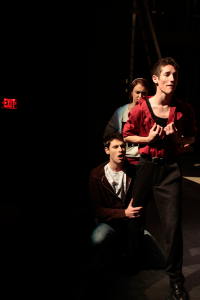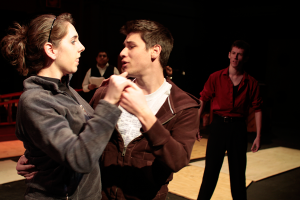By Frankie Farrar-Helm/entertainment editor

Photos by Casey Holder/The Collegian
The NE drama department adds a twist to the 16th century Shakespearean comedy A Midsummer Night’s Dream running March 2-5 in the NFAB NE Theatre.
The original play is a complex tale of two young couples, Hermia and Lysander and Helena and Demetrius, whose romantic schemes are confused and dampened by entering an enchanted forest where Oberon and Titania, the king and queen of the fairies, live. Puck, Oberon’s jester, is a mischievous fairy who delights in playing pranks on the four lovers. The themes illustrate that anyone can dream and that love triumphs in the end.
NE drama department’s abbreviated version of the comedy takes a different format.
“It’s a Mexican velvet spaghetti western,” said NE theater director Stephen Thomas.
Set in 20th century Mexico, the play incorporates all of the same themes and storylines but includes many creative elements never before seen in A Midsummer Night’s Dream, Thomas said.
In the NE production, the lovers run away to an enchanted desert instead of an enchanted forest. Complete with matadors, continuous mariachi bands and cacti that come alive, this version of the play has a “The Good, The Bad and The Ugly aesthetic,” Thomas said.
“It’s just a beautiful, fun play,” he said.
Joshua Phipps, who initially auditioned for Puck but instead plays the role of young lover Demetrius, finds the play interesting.
“I think what the play is possibly saying is that the world can seem so crazy and things seem so out of our control, and we can’t do anything to stop it. And then, before you know it, we’re back to reality,” Phipps said. “I think this is one of the most bizarre versions of A Midsummer’s Night Dream that anyone has ever seen, but that’s what makes it funny.”
Roxy Astemborski, who portrays Titania, said her experience playing in a comedy is completely different than her experience playing in the tragedy Macbeth last spring.

Photos by Casey Holder/The Collegian
“It’s [A Midsummer Night’s Dream] made up of all these different little vignettes, and it’s funny, so it makes it easier to play the part,” she said. “I hope people will leave thinking, ‘Wow, there is no limit to the way Shakespeare can be performed.’ There’s just no limit to the way Shakespeare can be enjoyed. I mean, you can always reinvent classical literature and make it fresh.”
Another student who originally auditioned for Puck, Elizabeth Price, said her character Helena is her exact opposite.
“She’s a little more desperate than I am. She’s a hopeless romantic and will die for the person she loves,” Price said. “The play is about conflict resolution in romantic relationships with a spin of ridiculousness.”
Professor Eric Devlin, head of the NE English department, said he is currently in his sixth season working with Shakespeare Dallas, a festival that has occurred every summer in Dallas for nearly 40 years, and will use his experience to play Oberon.
“I can help the students understand their lines as needed,” Devlin said. “This is a sweet-natured play about people working out their differences. It’s a very funny entertainment, and the audience is going to have a ball.”
Michael Spencer, who plays Lysander, said he enjoys playing the part of a “Casanova” because he is generally typecast as a lover.
“I’m very passionate, and Lysander is a very passionate character, too,” Spencer said. “I think the audience will say, ‘Lovers are stupid as hell.’”
Rachel De Leon said she originally auditioned for Titania but received the role of Hermia, whom she described as a “three-year-old temperamental diva.”
“When things don’t go her way, she throws a temper tantrum,” De Leon said. “There are lessons to be learned from this play. I think people could get a lot out of this one.”
Hector Cerrato, who plays the troublemaker Puck, said he will speak with a heavy Mexican “Cheech and Chong” accent to highlight the Southwestern setting of the play.
“We’re trying to emphasize the ridiculousness of the play,” he said. “It’s chaotic comedy but, at the same time, it’s not too chaotic. Like the title of the play, it does sometimes feel like a dream.”
Performances will begin at 7 p.m. Admission is free for TCC students, faculty and staff, $4 for non-TCC students and seniors and $6 for the general public. For reservations, call 817-515-6687.


















